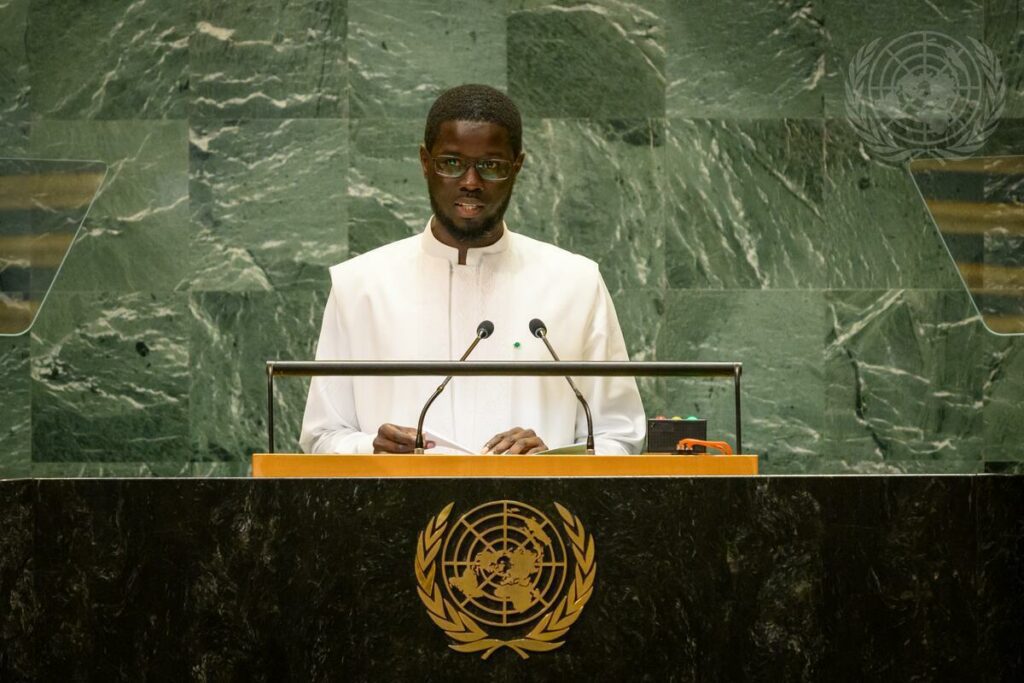Important speeches at this year’s 79th session of the United Nations General Assembly (UNGA 79) included calls for permanent African representation on the United Nations Security Council, a ceasefire in Palestine, the push to address the ongoing effects of climate change, and continued calls for reparations for African slavery.
“We will not be silent—ever,” said Valdrack Ludwing Jaentschke Whitaker, Nicaragua’s
minister for foreign affairs. “We denounce and condemn the genocide that the government of Israel and its ‘First World’ allies have committed, commit, and continue to commit against the glorious people of Palestine, against the courageous people of Lebanon, and against so many other brave, valiant, dignified people.”
“The world needs to look itself in the face, without complacency,” said Senegal’s President Bassírou Diomaye Faye. “The values we have sworn to defend are being trampled underfoot in so many regions of the globe. Whether we are in Gaza, Tel Aviv, Dakar, or elsewhere, every human being is the bearer of equal dignity, a dignity that transcends borders, cultures, and religious affiliations. We must ensure that this dignity is respected [and] protected for every being, without exception. This duty is the very essence of the United Nations.”
Addressing “ladies and gentlemen presidents of the world,” Colombia’s president, Gustavo Petro said, “In this room, a president’s ability to communicate depends on the amount of dollars he or she has in the budget; in the number of warplanes they have; and ultimately, in the capacity of their country to destroy humanity. The power of a country in the world is no longer exercised by the type of economic or political system or ideas it conveys, but by the power to destroy the life of mankind.
“Those of us who do not have that power of destruction, on the contrary, those of us who have the power to sustain life on the planet, speak without much attention being paid and often perhaps only to our own people. That is why we are not listened to when we vote to stop the genocide in Gaza. Even though we are the majority of the presidents of the world and represent the majority of humanity, we are not listened to by a minority of presidents who can stop the bombing. In other words, we are not being listened to by the presidents of the countries that can destroy humanity.”
Various remarks touched on the need for the U.N. Security Council to have a representative from Africa. The Security Council has 15 members, five of which––the United States, China, Russia, France, and the United Kingdom––are permanent members, while the other 10 non-permanent members are elected by the General Assembly to serve for two-year terms.
The continent of Africa has 54 countries, yet is still not represented on the Security Council. The United States has said it is willing to support two permanent seats for African countries. Uganda’s President Yoweri Museveni had his prime minister, Robinah Nabbanja, emphasize the importance of having African countries join as permanent members of the Security Council, with veto powers.
With 2025 set to mark the 80th anniversary of the United Nations’ founding, Gabriel Boric Font, president of Chile, said that when the UN celebrates that milestone, it needs to do so with a Security Council that “includes Brazil, India, and at least one country from Africa, among others.”
“Forgotten conflicts in Sudan and Yemen are causing atrocious suffering to almost 30 million people,” said Brazil’s President Luiz Inácio Lula da Silva. He also spoke about continuing failures to address climate change: “It is impossible to ‘deplanetize’ our life in common,” Lula said. “We are condemned [by] the interdependence of climate change. The planet no longer waits to hold the next generation accountable and is tired of unfulfilled climate agreements. It is weary of neglected carbon emission reduction targets and of financial aid to poor countries that never arrives. Denialism is succumbing to the evidence of global warming.”
The world needs a “reset,” Barbados Prime Minister Mia Amor Mottley told the UNGA, and the Security Council is one of many things that need to be reformed: “It is time for a global reset,” Mottley said. “This reset must see the end of all forms of discrimination. It must dismantle the rules and institutions that create these divides, restoring faith in the international community by fostering transparency, inclusion, and fairness. We cannot afford to perpetuate the colonial legacy, where some nations control the fate of others while ignoring their legitimate aspirations for development, justice, and equality.
“This is why the Caribbean Community, and indeed my own country, Barbados, join the growing call for reparations for slavery and colonialism. The scars of these historical injustices run deep. They are not merely a distant memory, but an ongoing reality for descendants of African people across the globe. Reparations are not simply about financial compensation. They are about justice, recognition, and development. The debt incurred by Britain for compensating slave owners was repaid in this century, almost 200 years later. This is a stark reminder that the burden of history does not fade with time. Therefore, the solution to reparations must be multigenerational and grounded in development.
“As the United Nations Decade for People of African Descent comes to a close, we must acknowledge that while progress has been made, the recognition, justice, and development promised by this decade have not yet been fully realized. It is imperative that we proclaim a second decade to continue the unfinished work. We owe it to future generations to right these wrongs, to address the profound impact of slavery and colonialism, and to begin the long-overdue journey toward healing and restoration.”
Like this:
Like Loading…
Related
Source link : http://www.bing.com/news/apiclick.aspx?ref=FexRss&aid=&tid=66fe5395d4764c86bb9db7ea0736f93a&url=https%3A%2F%2Famsterdamnews.com%2Fnews%2F2024%2F10%2F03%2Fu-n-s-2024-speeches-speak-about-palestine-reparations-climate-change-and-representation%2F&c=9369498082843261599&mkt=en-us
Author :
Publish date : 2024-10-02 17:11:00
Copyright for syndicated content belongs to the linked Source.
